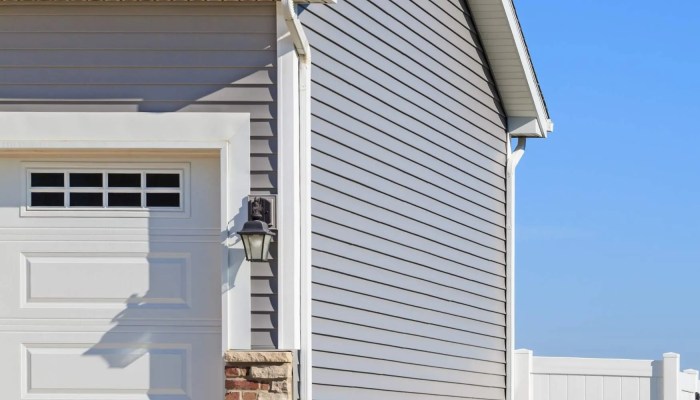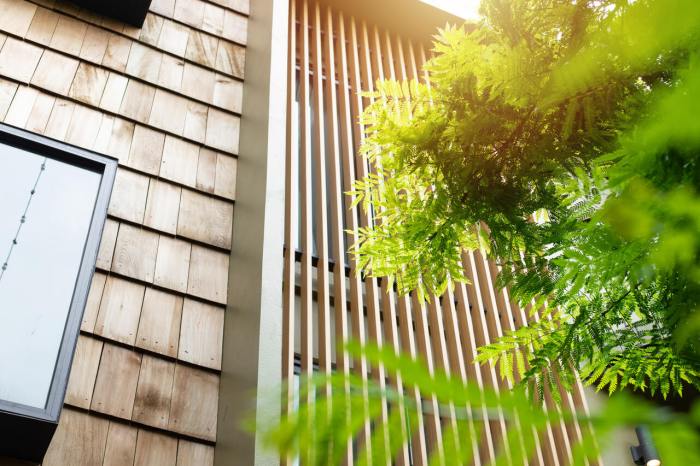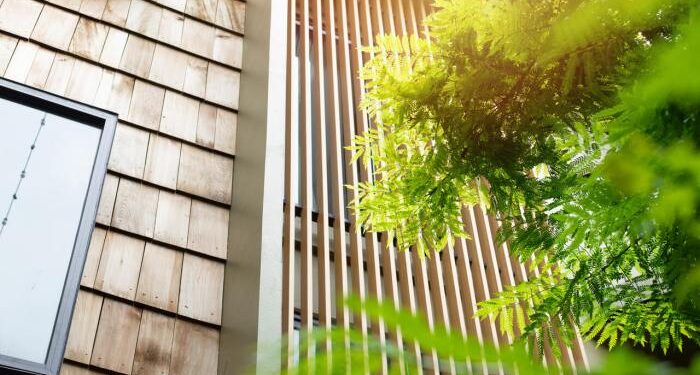As the world shifts towards more sustainable living, eco-friendly siding options have become a popular choice for homeowners looking to reduce their environmental impact. In this article, we delve into the realm of eco-friendly siding materials, exploring the benefits and options available in the market.
Let's uncover how you can make a difference while enhancing the aesthetics of your home.
Eco-Friendly Siding Options

Choosing eco-friendly siding materials is crucial in reducing our carbon footprint and preserving the environment for future generations. By opting for sustainable siding options, we can minimize the negative impact on the planet while still enhancing the aesthetics and value of our homes.
Popular Eco-Friendly Siding Options
- Bamboo Siding: Bamboo is a rapidly renewable resource that grows quickly and can be harvested without causing long-term damage to the environment. It is durable, pest-resistant, and offers a unique, natural look to homes.
- Recycled Wood Composite Siding: Made from recycled wood fibers and plastics, this siding option helps reduce waste while providing the durability and appearance of real wood. It is low maintenance and long-lasting.
- Cork Siding: Cork is harvested from the bark of cork oak trees without harming the tree itself. It is a natural insulator, fire-retardant, and offers a distinctive texture to the exterior of a home.
- Recycled Metal Siding: Metal siding made from recycled materials like aluminum or steel is not only durable and low maintenance but also highly recyclable at the end of its lifespan. It is energy-efficient and can be painted in various colors.
Environmental Benefits of Sustainable Siding Materials
Using sustainable siding materials has several environmental benefits, including:
- Reduced Carbon Footprint: Eco-friendly siding options typically require less energy and resources to manufacture, reducing greenhouse gas emissions and overall environmental impact.
- Promotion of Recycling: Many sustainable siding materials are made from recycled content or are recyclable themselves, contributing to the circular economy and minimizing waste in landfills.
- Preservation of Natural Resources: By choosing siding options like bamboo or cork that come from rapidly renewable sources, we help protect forests and other ecosystems from deforestation and depletion.
- Improved Indoor Air Quality: Some eco-friendly siding materials are non-toxic and emit fewer volatile organic compounds (VOCs), creating a healthier living environment for homeowners.
Recycled Siding Materials
When it comes to eco-friendly siding options, using recycled materials is a great way to reduce waste and lessen the environmental impact of construction projects. Recycled siding materials are gaining popularity for their sustainability and unique aesthetic appeal.Recycled siding materials come in various types, each offering different benefits in terms of durability, cost-effectiveness, and environmental impact.
These materials are typically sourced from post-consumer waste, industrial by-products, or salvaged materials.
Types of Recycled Siding Materials
- Reclaimed Wood: Old barn wood, salvaged pallets, and other reclaimed wood materials can be repurposed into beautiful siding options. Reclaimed wood siding offers a rustic and unique look while reducing the demand for new timber.
- Recycled Vinyl: Vinyl siding made from recycled PVC materials is a durable and low-maintenance option for eco-conscious homeowners. Recycled vinyl siding is cost-effective and comes in a variety of colors and styles.
- Recycled Metal: Aluminum and steel siding made from recycled metal scraps are highly durable and resistant to weathering. Recycled metal siding is often used in modern and industrial-style designs.
Manufacturing Process of Recycled Siding Materials
Recycled siding materials go through a meticulous manufacturing process to ensure quality and durability. The process typically involves:
- Collection and Sorting: Post-consumer waste or salvaged materials are collected and sorted based on their quality and suitability for recycling.
- Cleaning and Processing: The materials undergo cleaning and processing to remove impurities and prepare them for manufacturing.
- Melting or Shredding: Depending on the material, it is melted down or shredded into smaller pieces to be molded or formed into siding panels.
- Manufacturing: The recycled materials are then molded, extruded, or formed into siding panels using specialized equipment and techniques.
- Finishing: The siding panels are finished with coatings, paints, or textures to enhance their appearance and durability.
Sustainable Wood Siding
When it comes to sustainable wood siding, the key lies in using wood that is responsibly sourced from well-managed forests. This means that the wood is harvested in a way that promotes reforestation and biodiversity, ensuring that the natural ecosystem is not harmed in the process.
Characteristics of Sustainably Sourced Wood for Siding
- Sustainably sourced wood for siding is typically certified by organizations like the Forest Stewardship Council (FSC), ensuring that it meets specific environmental and social standards.
- It is durable and resistant to rot and decay, making it a long-lasting option for siding.
- It provides a natural and rustic look, adding warmth and character to a home's exterior.
Environmental Impact Comparison
Traditional wood siding often comes from clear-cutting forests, leading to deforestation and habitat destruction. On the other hand, sustainable wood siding promotes the health of forests by following responsible harvesting practices. This helps in preserving ecosystems and reducing the overall environmental impact of wood siding.
Tips for Maintaining Sustainable Wood Siding
- Regularly inspect and clean the siding to prevent mold and mildew growth.
- Apply a protective finish or stain to enhance the durability of the wood and protect it from the elements.
- Address any cracks or damage promptly to prevent further deterioration.
Fiber Cement Siding
Fiber cement siding is a popular eco-friendly option made from a mixture of cement, sand, and cellulose fibers. This composition makes it a durable and sustainable choice for siding materials.
Composition and Manufacturing Process
Fiber cement siding is produced through a process of mixing the raw materials together and then curing them under high heat and pressure. This results in a strong and resilient material that is resistant to fire, insects, and rot.
Durability and Energy Efficiency
Fiber cement siding is known for its longevity, often lasting up to 50 years or more with minimal maintenance. Its high durability also translates to energy efficiency, as it helps to insulate the home and reduce energy consumption for heating and cooling.
Cost and Maintenance Comparison
In terms of cost, fiber cement siding falls in the mid-range compared to other eco-friendly options. While it may require repainting every 10-15 years, the overall maintenance is relatively low compared to wood siding. Additionally, the long lifespan of fiber cement siding can make it a cost-effective choice in the long run.
Wrap-Up

In conclusion, eco-friendly siding options offer a blend of sustainability, durability, and style for your home. By choosing environmentally conscious materials, you not only contribute to a greener planet but also create a healthier living space for you and your family.
Make the eco-friendly choice today and enjoy the lasting benefits it brings.
General Inquiries
Are eco-friendly siding options more expensive than traditional ones?
Eco-friendly siding options can initially have a higher upfront cost, but they often result in long-term savings due to their durability and energy efficiency.
Do recycled siding materials require special maintenance?
Recycled siding materials generally require the same maintenance as traditional siding, such as regular cleaning and inspections for any damage.
Is sustainable wood siding prone to pests or rot?
Properly maintained sustainable wood siding is less prone to pests and rot compared to traditional wood siding, as it is often treated and sourced responsibly.



